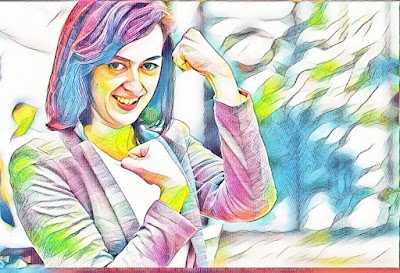Personality Traits Influencing OB:-
Table of Contents
Personality Traits Influencing OB
|
Personality Traits/ Major Attributes OR Characteristics influencing Organizational Behavior:-
1.Locus of Control:-
This
concept denotes that whether people are in control of events or they control events.
Those who have internal control of locus believe that they control and shape
events in their lives. Other hand, those who have external locus of control
believe that events occur purely by chance and it is beyond the control. Internal
as compared to external, seeks job related information, try to influence other
at work, seek opportunities and rely more on their abilities and judgement at work.
2.Machiavellians:-
The
capacity of achieving more benefits through trick and tactfulness is called
Machiavellians. It focuses on gaining
power and enforcing control to others. The degree of Machiavellians differs
from person to person. Highly Machiavellian people are calm, logical, practical
and realistic in nature. They try to control situations and change systems for
their benefits. They are stubborn, less get persuaded, winning more in nature.
They convince others more. Low Machiavellian people never manipulate others.
They give more value to loyalty and friendship. They are more sentimental and
they can't speak fraud for self success achievement. Highly Machiavellian
people are most successful in work because they have higher bargaining skills.
3.Self Esteem:-
It
is the way of judging the value of self. Highly self esteemed person seeks
higher job status, confident in capacity and higher performance for intrinsic
satisfaction from these achievements. Low self esteemed persons are less
confident. They work at lower level of job and they seek extrinsic rewards.
4.Self Adjusting:-
It is capacity of the person to adjust self behavior with external or situational factors. Highly self adjusting people show higher adjusting capacity with external situations. They show different behaviors in different situations. They are less uniform in their behaviors. They display various faces depending on the circumstance.
Less adjusting people are constant with changing situations. They never adjust themselves with changing scenarios. Highly adjusting people get more success in life. These people are more suitable for managerial level.
5.Risk Taking:-
It
is the risks taking capacity of individual in order to make decisions. Risk
taking capacity of people varies from person to person. Highly risk taking
people make decisions faster and use less information before making decision
than less risk taking people.
(i).A High risk taking is appropriate in a
stock trader which demands quick decision making.
(ii).A
low risk taking is appropriate in auditing activities which needs high level of
accuracy.
6.Authoritarianism:-
It discloses the variations in power and
status in an organization. Highly authoritarian people are strict and highly
ethical in nature. They strictly follow and enforce regulations. They enjoy
working at fixed and structured working environment. This working environment
is directed by regulations and procedures. They value power more so that they
follow power blindly. These people are strict, conservative, less educated and
narrow minded. They try to make good followers. They work under higher
supervision. They have more productivity in work.
7.Dogmatism:-
It is the mental state
where individual thinks self superior. He thinks his all activities are
correct. He assumes his opinions and attitudes are right always. He never
accepts errors of his opinions and attitudes though these are impractical.
Highly dogmatic people are conservative and narrow minded. They are stubborn so
that they never accept advices and suggestion given by others. They never
accept the change in working procedures and opinions. Less dogmatic people are
liberal minded. They accept suggestions and advices given by others. They enjoy
learning new technology and opinion. They respect existence of others.
8.Personality type:-
People are divided in to two types due to their
personality.
|
"A"
Type People |
"B"
Type People |
|
Talks
rapidly |
Less
talkative |
|
Devoted
to work |
Careless
to work |
|
Highly
competitive |
Less
competitive |
|
Laborious |
Sloth |
|
Never
wastes time |
Wastes time |
|
No
patience |
Patience
|
|
Punctual
to time |
Time
careless |
|
Tempered |
Less tempered |
They can work hardly even in pressure. They are fast in decision-making but they can't take best decisions. This type is fit for lower level management. 'B' type people take decision slow but their decisions too effective in nature.
9. Introversion and Extraversion:-Introversion
people are quite, shy, cautions and lonely in nature. Just oppositely extraverson
people are talkative, outgoing, social, assertive and self confident. Researchers
have suggested that extroverts are higher performer than introverts in the
organization.
10.Proactive personality:-
Proactive
personality is always self-active for achievement of success. They study
environment and they attempt to grab opportunities. They go through creative
ways though there are too many obstacles. They face challenges. These people
are appropriate in managerial post.
Frequently Asked Questions
|
1.How
personality influences organizational behavior 2.Personality
attributes influencing OB. 3.Major
personality attributes influencing ob. 4.Example
of personality in organizational behavior. 5.Personality
and perception in organizational behavior. 6.Big
five personality traits in organizational behavior. 7.Types
of personality in organizational behavior. 8.Stages
of personality in organizational behavior. 9.What
are the 5 personality traits in Organizational Behavior? 10.What
are the 4 types of personality in Organizational Behavior? 11.Personality
Attributes Influencing Behavior |
Conclusions
|
Personality
influences the individual behavior. Behavior of employee influences the
organizational performance so that managers must try to understand personality
traits of employees. So, employees can handle and use them for achieving
organizational objectives. |


.jpeg)

.jpeg)

.jpeg)
0 Comments